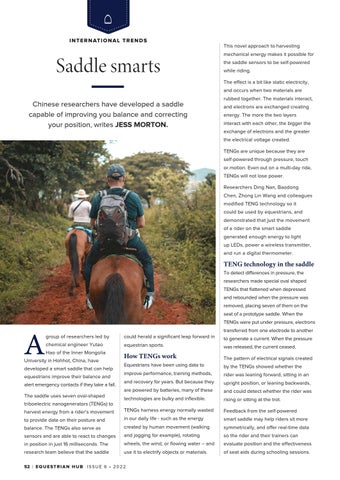I N T E R N AT I O N A L T R E N D S
Saddle smarts
This novel approach to harvesting mechanical energy makes it possible for the saddle sensors to be self-powered while riding. The effect is a bit like static electricity, and occurs when two materials are
Chinese researchers have developed a saddle capable of improving you balance and correcting your position, writes JESS MORTON.
rubbed together. The materials interact, and electrons are exchanged creating energy. The more the two layers interact with each other, the bigger the exchange of electrons and the greater the electrical voltage created. TENGs are unique because they are self-powered through pressure, touch or motion. Even out on a multi-day ride, TENGs will not lose power. Researchers Ding Nan, Baodong Chen, Zhong Lin Wang and colleagues modified TENG technology so it could be used by equestrians, and demonstrated that just the movement of a rider on the smart saddle generated enough energy to light up LEDs, power a wireless transmitter, and run a digital thermometer.
TENG technology in the saddle To detect differences in pressure, the researchers made special oval shaped TENGs that flattened when depressed and rebounded when the pressure was removed, placing seven of them on the seat of a prototype saddle. When the
A
TENGs were put under pressure, electrons transferred from one electrode to another group of researchers led by
could herald a significant leap forward in
to generate a current. When the pressure
chemical engineer Yutao
equestrian sports.
was released, the current ceased.
Hao of the Inner Mongolia
How TENGs work
The pattern of electrical signals created
Equestrians have been using data to
by the TENGs showed whether the
improve performance, training methods,
rider was leaning forward, sitting in an
and recovery for years. But because they
upright position, or leaning backwards,
are powered by batteries, many of these
and could detect whether the rider was
technologies are bulky and inflexible.
rising or sitting at the trot.
harvest energy from a rider’s movement
TENGs harness energy normally wasted
Feedback from the self-powered
to provide data on their posture and
in our daily life - such as the energy
smart saddle may help riders sit more
balance. The TENGs also serve as
created by human movement (walking
symmetrically, and offer real-time data
sensors and are able to react to changes
and jogging for example), rotating
so the rider and their trainers can
in position in just 16 milliseconds. The
wheels, the wind, or flowing water – and
evaluate position and the effectiveness
research team believe that the saddle
use it to electrify objects or materials.
of seat aids during schooling sessions.
University in Hohhot, China, have developed a smart saddle that can help equestrians improve their balance and alert emergency contacts if they take a fall. The saddle uses seven oval-shaped triboelectric nanogenerators (TENGs) to
52 | E Q U E S T R I A N H U B I S S U E 6 • 2 0 2 2
























